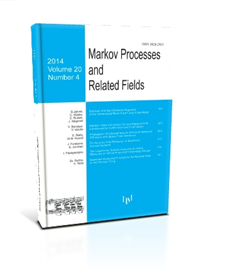On Convergence to Equilibrium Distribution for Schrodinger Equation
A.I. Komech, E.A. Kopylova, N.J. Mauser
2005, v.11, Issue 1, 81-110
ABSTRACT
Consider the Schrodinger equation with constant or variable coefficients in $R^3$. We study a distribution $\mu_t$ of a random solution at a time $t \in R$. An initial measure $\mu_0$ has translation-invariant correlation matrices, zero mean and finite mean density of charge. It also satisfies a Rosenblatt- or Ibragimov - Linnik-type mixing condition. The main result is the convergence of $\mu_t$ to a Gaussian measure as $t \to\pm\infty$ which gives the Central Limit Theorem for the Schrodinger equation. The proof for the case of constant coefficients is based on a spectral cutoff and an analysis of long time asymptotics of the solution in the Fourier representation and Bernstein's `room-corridor' argument. The case of variable coefficients is reduced to that of constant ones by a version of a scattering theory for the solutions with infinite charge.
Keywords: Schrodinger equation,Cauchy problem,random initial solution,mixing condition,Gaussian measure,scattering theory,correlation functions
COMMENTS
Please log in or register to leave a comment

